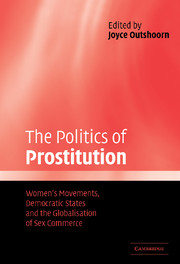 The Politics of Prostitution
The Politics of Prostitution Book contents
- Frontmatter
- Contents
- List of figures
- List of tables
- Notes on contributors
- Preface
- 1 Introduction: prostitution, women's movements and democratic politics
- 2 The women's movement and prostitution politics in Australia
- 3 Taxes, rights and regimentation: discourses on prostitution in Austria
- 4 Prostitution policies in Britain, 1982–2002
- 5 Prostitution as public nuisance: prostitution policy in Canada
- 6 Towards a new prohibitionism? State feminism, women's movements and prostitution policies in Finland
- 7 Prostitute movements face elite apathy and gender-biased universalism in France
- 8 The politics of prostitution and trafficking of women in Israel
- 9 Italy: the never-ending debate
- 10 Voluntary and forced prostitution: the ‘realistic approach’ of the Netherlands
- 11 State feminism and central state debates on prostitution in post-authoritarian Spain
- 12 Criminalising the john – a Swedish gender model?
- 13 The invisible issue: prostitution and trafficking of women and girls in the United States
- 14 Comparative prostitution politics and the case for state feminism
- Appendix 1 Independent variable indicators
- Appendix 2 Worksheets
- References
- Index
7 - Prostitute movements face elite apathy and gender-biased universalism in France
Published online by Cambridge University Press: 22 September 2009
- Frontmatter
- Contents
- List of figures
- List of tables
- Notes on contributors
- Preface
- 1 Introduction: prostitution, women's movements and democratic politics
- 2 The women's movement and prostitution politics in Australia
- 3 Taxes, rights and regimentation: discourses on prostitution in Austria
- 4 Prostitution policies in Britain, 1982–2002
- 5 Prostitution as public nuisance: prostitution policy in Canada
- 6 Towards a new prohibitionism? State feminism, women's movements and prostitution policies in Finland
- 7 Prostitute movements face elite apathy and gender-biased universalism in France
- 8 The politics of prostitution and trafficking of women in Israel
- 9 Italy: the never-ending debate
- 10 Voluntary and forced prostitution: the ‘realistic approach’ of the Netherlands
- 11 State feminism and central state debates on prostitution in post-authoritarian Spain
- 12 Criminalising the john – a Swedish gender model?
- 13 The invisible issue: prostitution and trafficking of women and girls in the United States
- 14 Comparative prostitution politics and the case for state feminism
- Appendix 1 Independent variable indicators
- Appendix 2 Worksheets
- References
- Index
Summary
Introduction
Prostitution policy experts in France identify three different regimes of prostitution policy: regulatory, prohibitionist and abolitionist (e.g. LeGardinier 1989, 1997; Louis 1991). Since 1960, France has followed an abolitionist approach to prostitution. For most French policy experts and practitioners, this approach includes policies that seek to eliminate any official regulation of prostitution, to punish the organisation of prostitution including public solicitation and pimping, to prevent the social conditions that lead to prostitution, and to help prostitutes leave prostitution. Individual prostitution itself is not illegal. There is disagreement, however, over whether an abolitionist regime should eliminate prostitution or its regulation (e.g. Cabiria 1999: 23–5).
Up until 1960, France took a regulatory approach to prostitution. In 1946, the law Richard closed state-run bordellos or maisons closes, but maintained the monitoring of prostitutes. In 1960, France signed the 1949 UN Treaty on the ‘Elimination of the Traffic in Persons and of the Exploitation of the Prostitution of Others’. From 1960 to 1965, twenty-five policy statements were adopted to establish the framework for the abolitionist regime (Femmes et Monde 1987: 77). Individual policy-makers and politicians have periodically argued to reopen state-run bordellos in the interest of public health and order. The last major public debate on re-opening the maisons closes took place in 1990. In 2000, the variety of policy actors involved with prostitution policy considered neither regulatory nor prohibition regimes a viable alternative. Recent public opinion polls echo the elite consensus.
- Type
- Chapter
- Information
- The Politics of ProstitutionWomen's Movements, Democratic States and the Globalisation of Sex Commerce, pp. 123 - 143Publisher: Cambridge University PressPrint publication year: 2004
- 5
- Cited by


